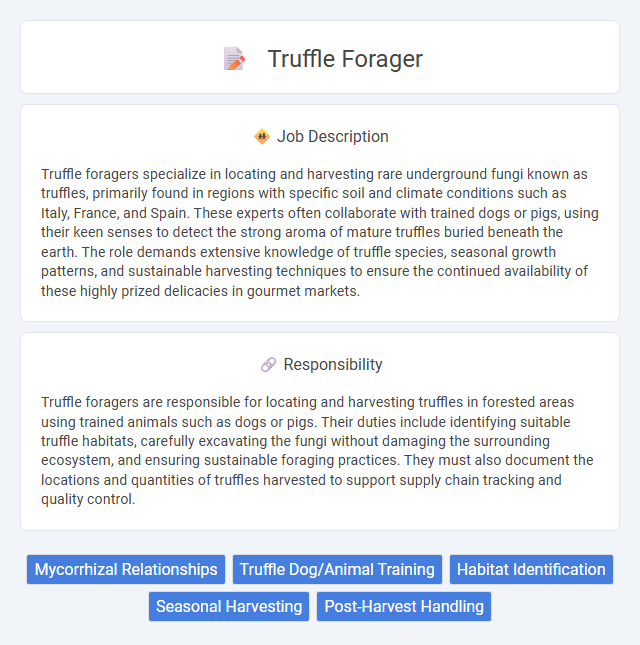
Truffle foragers specialize in locating and harvesting rare underground fungi known as truffles, primarily found in regions with specific soil and climate conditions such as Italy, France, and Spain. These experts often collaborate with trained dogs or pigs, using their keen senses to detect the strong aroma of mature truffles buried beneath the earth. The role demands extensive knowledge of truffle species, seasonal growth patterns, and sustainable harvesting techniques to ensure the continued availability of these highly prized delicacies in gourmet markets.
Truffle foraging likely suits individuals who enjoy outdoor activities and have a patient, observant nature, as the work involves searching through forests for delicate fungi. People with good physical stamina and a strong sense of smell probably adapt well to this job, given the often rugged terrain and reliance on scent detection. Those who prefer structured environments or dislike unpredictable work conditions might find this profession less suitable.
Qualification
A truffle forager must have an in-depth knowledge of fungal biology and the specific habitats where truffles thrive, such as calcareous soils and certain tree roots. Proficiency in training and handling truffle-hunting dogs or pigs is essential to accurately locate underground truffles without damaging them. Experience in distinguishing between various truffle species and understanding seasonal growth patterns enhances the forager's effectiveness and market value.
Responsibility
Truffle foragers are responsible for locating and harvesting truffles in forested areas using trained animals such as dogs or pigs. Their duties include identifying suitable truffle habitats, carefully excavating the fungi without damaging the surrounding ecosystem, and ensuring sustainable foraging practices. They must also document the locations and quantities of truffles harvested to support supply chain tracking and quality control.
Benefit
Truffle foragers likely experience significant financial benefits due to the high market value of truffles, which can drive substantial income opportunities. The role may also offer health advantages by promoting outdoor activity and connection with nature, contributing to physical well-being. Furthermore, individuals in this job probably enjoy a unique lifestyle centered on seasonal work and the satisfaction of discovering prized culinary ingredients.
Challenge
Truffle foragers likely face significant challenges navigating dense forests and uneven terrain while searching for elusive truffles hidden underground. The unpredictability of seasonal growth patterns and environmental conditions probably adds complexity to locating these valuable fungi. Success in this role depends on keen observation skills and experience to increase the probability of harvesting quality truffles.
Career Advancement
Truffle forager jobs offer unique career advancement opportunities through skill development in fungi identification and sustainable harvesting techniques. Professionals in this field can progress to roles such as truffle farm managers, quality control specialists, or supply chain coordinators within gourmet food industries. Expertise in truffle foraging also opens pathways to consultancy positions and collaboration with luxury culinary brands seeking rare ingredients.
Key Terms
Mycorrhizal Relationships
Truffle foragers rely on understanding the symbiotic mycorrhizal relationships between truffles and host trees, such as oaks and hazelnuts, which are crucial for truffle growth and nutrient exchange. These fungi form ectomycorrhizal associations, enhancing water and mineral absorption for the tree roots while receiving carbohydrates in return, creating an essential ecosystem for truffle proliferation. Mastery of these ecological interactions enables foragers to identify promising habitats and optimize truffle harvests effectively.
Truffle Dog/Animal Training
Training truffle dogs involves specialized techniques to enhance their natural scent detection abilities, focusing on positive reinforcement and consistent practice to locate underground truffles effectively. Trainers use specific scent samples and gradually increase search complexity, ensuring dogs can distinguish truffle scents from other fungi. This precise animal training is crucial for successful truffle foraging, as well-trained dogs significantly increase the efficiency and yield of truffle harvests.
Habitat Identification
Truffle foragers specialize in habitat identification by analyzing soil composition, moisture levels, and symbiotic tree species such as oaks and hazelnuts to locate ideal truffle-growing environments. These experts use ecological indicators and historical data to pinpoint areas where truffles are likely to thrive, enhancing the efficiency of truffle hunting. Mastery in recognizing specific mycorrhizal relationships and microclimates is essential for successful truffle foraging and sustainable harvests.
Seasonal Harvesting
Truffle forager jobs primarily involve seasonal harvesting, typically during the autumn and winter months when truffles reach peak maturation. Expert foragers use trained dogs or pigs to locate buried truffles, ensuring optimal harvest quality and preserving natural ecosystems. Seasonal harvesting requires in-depth knowledge of truffle habitats, soil conditions, and weather patterns to maximize yield and maintain sustainable practices.
Post-Harvest Handling
Efficient post-harvest handling in truffle foraging involves careful cleaning and storage to preserve aroma and quality. Truffles require gentle brushing to remove soil without damaging their delicate skin, followed by refrigeration at 1-4degC in breathable containers to maintain freshness. Proper moisture control and timely delivery to markets or processors enhance shelf life and maximize market value.
 kuljobs.com
kuljobs.com